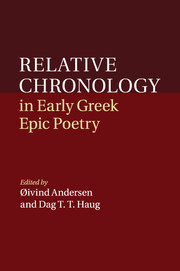Book contents
- Frontmatter
- Contents
- Notes on contributors
- Preface
- Abbreviations
- Introduction
- Chapter 1 πρῶτόν τε καὶ ὕστατον αἰὲν ἀείδειν
- Chapter 2 Relative chronology and an ‘Aeolic phase’ of epic
- Chapter 3 The other view
- Chapter 4 Late features in the speeches of the Iliad
- Chapter 5 Tmesis in the epic tradition
- Chapter 6 The Doloneia revisited
- Chapter 7 Odyssean stratigraphy
- Chapter 8 Older heroes and earlier poems
- Chapter 9 The Catalogue of Women within the Greek epic tradition
- Chapter 10 Intertextuality without text in early Greek epic
- Chapter 11 Perspectives on neoanalysis from the archaic hymns to Demeter
- Chapter 12 The relative chronology of the Homeric Catalogue of Ships and of the lists of heroes and cities within the Catalogue
- Chapter 13 Towards a chronology of early Greek epic
- Bibliography
- General index
- Index locorum
Chapter 12 - The relative chronology of the Homeric Catalogue of Ships and of the lists of heroes and cities within the Catalogue
Published online by Cambridge University Press: 05 January 2012
- Frontmatter
- Contents
- Notes on contributors
- Preface
- Abbreviations
- Introduction
- Chapter 1 πρῶτόν τε καὶ ὕστατον αἰὲν ἀείδειν
- Chapter 2 Relative chronology and an ‘Aeolic phase’ of epic
- Chapter 3 The other view
- Chapter 4 Late features in the speeches of the Iliad
- Chapter 5 Tmesis in the epic tradition
- Chapter 6 The Doloneia revisited
- Chapter 7 Odyssean stratigraphy
- Chapter 8 Older heroes and earlier poems
- Chapter 9 The Catalogue of Women within the Greek epic tradition
- Chapter 10 Intertextuality without text in early Greek epic
- Chapter 11 Perspectives on neoanalysis from the archaic hymns to Demeter
- Chapter 12 The relative chronology of the Homeric Catalogue of Ships and of the lists of heroes and cities within the Catalogue
- Chapter 13 Towards a chronology of early Greek epic
- Bibliography
- General index
- Index locorum
Summary
I should like to begin with some preliminary remarks. The topic is not new and is much debated. I myself have set forth my opinions on it in several publications, but there are some new aspects which seem worth discussing. I presuppose that we are able to speak of relative chronology only if it is possible to detect recognizable differences in the age of certain parts of the text or of certain constituent elements of it; and I think this is the case with the so-called Homeric Catalogue of Ships (Il. 2.492–759).
My thesis is that the poet of the Iliad took over the epic Catalogue of Ships in a fixed form as a whole from an extraneous source or from one of his own earlier performances of another epic and adapted it to this poem.
- Type
- Chapter
- Information
- Relative Chronology in Early Greek Epic Poetry , pp. 210 - 223Publisher: Cambridge University PressPrint publication year: 2011

